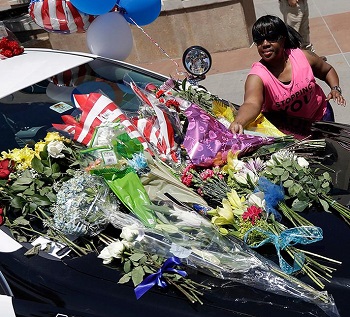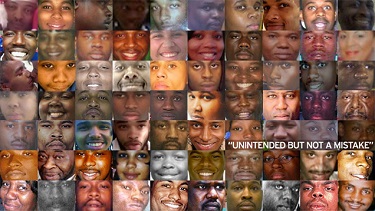Home » Posts tagged 'African American' (Page 2)
Tag Archives: African American
It Will Take Courage to End This Nightmare
by Denise Moorehead
As I listened to the news this week – first about still more unarmed black men dying at the hands of the police and then yesterday morning about 12 Dallas policemen being gunned down – I got angrier and angrier at the hypocrisy of the newscasters and pundits. To avoid being called cop haters or Black Lives Matter apologists, everyone spoke of their shock at what happened in Louisiana and Minnesota and then said, “but how could what happened in Dallas, happen?”
It is ridiculous, even offensive, to pretend that we don’t see the connection between the seemingly unending string of police shootings of black men as well as women and children – some found to be murders – and the very cruel actions of the Dallas shooter. The Dallas shooter left five families without fathers, husbands, sons, brothers, uncles and nephews. I feel truly, truly sorry for their families. It is not fair at all that these officers were randomly chosen to die in this revenge killing.
 To refuse to acknowledge the connection, however, is part of the reason that the gunman did what he did. He believed that no one in power is doing anything to stop the random killing of black men across the United States.
To refuse to acknowledge the connection, however, is part of the reason that the gunman did what he did. He believed that no one in power is doing anything to stop the random killing of black men across the United States.
I can never condone what the Dallas shooter did. I have a husband, father and nephew. But I do not pretend that I do not know why he believed his actions were rational. A 2015 study by the Washington Post found that unarmed black men were seven times more likely than whites to die by police gunfire. It is not getting better.
When Class and Race Collide
Police have very stressful jobs and must make life and death decisions in the moment. I’ve been told that when a policeman kills someone in the line of duty, that death stays with him or her forever. But when a string of officers kill 100s of black people each year and virtually none of the police are found guilty of a felony crime, the anger in the black community (and that of our allies) builds and builds – and eventually explodes.
And tinder has been added to the resulting raging fire by further provocations like the recent online sale by George Zimmerman of the gun used to murder Trayvon Martin, the rise of white supremacists (who have openly said Donald Trump’s rhetoric has helped their recruitment), and the continuing demonization of (especially poor and working) black people, especially young black men.
Those of us who care about ending classism and racism see the terrible irony in all of these killings – civilians and police. People from low-income and working-class backgrounds are being pitted against each other.
While black women, men and children of all classes are being harassed, assaulted and killed, a disproportionate number of those killed are less class advantaged. They are mostly low-income or working-class men hustling to make a dollar by selling CDs or cigarettes, driving old cars that have broken down, or in driving “suspiciously” through suburban neighborhoods.
While police in some big cities can make very good incomes, many do not. And most officers have class backgrounds that are not dissimilar from those they must now “police.”
About Class and Race from the Start
It is important to understand the class and race issues underlying the creation of today’s police forces. According to Eastern Kentucky University, the genesis of the modern police organization in the South is the “Slave Patrol,” created to return runaway slaves, deter slave revolts and maintain a discipline among slaves on plantations. Of course, only owning class people had plantations.
While black women, men and children of all classes are being harassed, assaulted and killed, a disproportionate number of those killed are less class advantaged.
In the North, police forces emerged from the hundreds, then thousands of armed men hired by business moguls to impose order on the new working class neighborhoods filling with immigrant wage workers. According to In These Times, Chicago businessmen donated money to buy the police rifles, artillery, Gatling guns, buildings, and money to establish a police pension out of their own pockets.
Speak Up and Show Up
The police were not created to protect and serve all classes. But we must speak up and show support for those police departments that are trying to be a force for all citizens. For example, the Camden, New Jersey, police department was completely revamped in 2013, which has since led to a significant reduction in crime. The department began emphasizing the importance of engaging with the community and forging relationships through one-on-one contact. According to the police chief, the department is focused on “building community first and enforcing the law second.”
Attend your local town meeting, or city council meetings, or aldermans’ meeting when there are police issues, and share the story of Camden and other departments that are trying to serve all classes and races.
And speak up and show up when we see wrong doing. In 2011, the Department of Justice found that the East Haven, Connecticut, police force had engaged in discriminatory policing against Latinos after a local priests’ videotapes helped trigger a federal investigation. Just three years later, federal compliance describe the turnaround within the department as “remarkable.” One person has the potential to make huge change.
Come together with other UUs and other justice-minded people to support:
- our own people of color organizations like Black Lives of UU
- BLM
- the NAACP
- and so many (below)
Refuse to become desensitized to the horror. Don’t change the channel, refuse to listen to the news or simply wring your hands. Talk to your friends and family when they say, “What can we do? It will never change.”
Educate yourself on class and race issues, and on the centuries-old fraught relationship between law enforcement and African-Americans. Refuse to refuse to believe black people when they talk about institutional racism in America.
Write letters to local, state and federal officials. Tell the Obama Administration and (especially) Congress that in a federal budget of $56 billion for police grants, it is a tragedy that only $70 million is allocated to improve police-community relations. (And much of that $70 million is for body-worn cameras, not community engagement.)
See the long list below of actions you can take and groups you can join and/or support.
And vote for people who can bring us together, not tear us further apart.
We know what it will take to end this nightmare. Now let’s summon the courage to do so.
More Reading/Listening
- We Already Know How to Reduce Police Racism and Violence
- This Country Needs a Truth and Reconciliation Process on Violence Against African Americans—Right Now
- Class and The Movement for Black Lives
- Can faith communities heal racial inequality? In Kansas City, a resounding yes
Organizations
- Black Lives Matter
- Brady Campaign to Prevent Gun Violence
- Campaign Zero – Solutions
- Color of Change’s petition calling for justice for Alton Sterling and Philando Castile
- Cut50.org (founded by Van Jones)
- NAACP
- Newtown Action Alliance
- Showing Up for Racial Justice (link to Black-led racial justice organizations you can support)
- The ACLU Mobile Justice App



